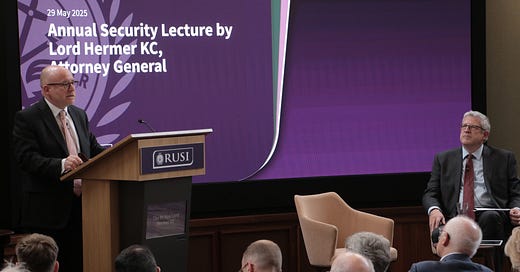Lord Hermer KC “regrets” a reference to the Nazi jurist Carl Schmitt (1888-1985) in a lecture the attorney general delivered on Thursday, Downing Street told reporters the following day.
The attorney general gave a speech defending international law which underpins our security, protects against threats from aggressive states like Russia and helps tackle organised immigration crime.
He rejects the characterisation of his speech by the Conservatives. He acknowledges, though, that his choice of words was clumsy and regrets having used this reference.
This was the passage in Hermer’s speech that has led to widespread criticism:
The challenges we face are truly enormous and, as the foreign secretary observed in his Locarno speech, the world order had irreversibly changed. [David Lammy] said:
“We have to accept that there is no going back. We must stop the 1990s clouding our vision. The post-Cold War peace is well and truly over. This is a changed strategic environment… Europe’s future security is on a knife edge.”
Allow me to explain how our policy of progressive realism meets this moment. And the role the law, and the international rules-based order, plays in our approach. Because our approach is a rejection of the siren song that can sadly now be heard in the Palace of Westminster, and in some spectrums of the media, that Britain abandons the constraints of international law in favour of raw power.
This is not a new song.
The claim that international law is fine as far as it goes, but can be put aside when conditions change, is a claim that was made in the early 1930s by “realist” jurists in Germany, most notably Carl Schmitt, whose central thesis was in essence the claim that state power is all that counts, not law. Because of the experience of what followed in 1933, far-sighted individuals rebuilt and transformed the institutions of international law, as well as internal constitutional law.
Part of our pragmatic approach to foreign affairs is to learn from experience — to analyse without preconception or dogma what has been shown to protect British interests in the world and what has not. Schmitt’s so-called realism has for eighty years been refuted by the fact that these institutions, post-1945 institutions, have provided the basis until now for western and other states, wildly varied in nature, to interact with each other under conditions of peace and stability, all the while pursuing their own strategic interests.
Raw, wild power, on its own, in so many different calculi, has rarely been picked as a modus operandi because it was not, is not, a realistic way to advance national interests.
It is important to stress the role of Britain in the rebuilding of the post-war consensus, in the development of international law and multinational institutions — all a rejection of the discredited Schmittian conception of power.
The government’s senior law officer added:
It is obvious that Russia and other malign state-actors see the undermining of the legal-based framework as a core objective. Putin does not simply apply a Schmittian approach to the rule of law within the boundaries of Russia and its proxies, he recognises the huge strategic advantage that would flow in undermining the post-1945 international law framework.
It’s why he invokes exceptionalism to justify his crime of aggression, it is why he devotes so much resources to undermining democracies and to seeking to fuel divisions within them.
In an astute take-down of the attorney general’s lecture, Professor Richard Ekins KC (hon) says:
Carl Schmitt is not, mercifully, a household name in Britain but he does still feature in scholarly debate, often when an academic lawyer wishes to smear his or her opponents without evidence or argument.
Ekins, head of the judicial power project at the think tank Policy Exchange, tells readers of the Spectator that Hermer’s approach to international law is “incompatible with our political history and constitutional tradition”.
I will not be writing here tomorrow or (probably) on Tuesday. I plan to discuss Hermer’s lecture in a podcast to be published here on Wednesday.





I fear the Spectator is not amongst my battery of on-line reading material (to which the Observer has recently been added). Any chance of a summary?
Anyone who has read Ekin’s views on law will understand his *sensitivity* about deserved comparisons to Schmitt… poor petal. Happily Schmitt is a household name anywhere the law is discussed seriously - Ekin will just have to learn to accept the comparison or become less of a lickspittle to the far right.